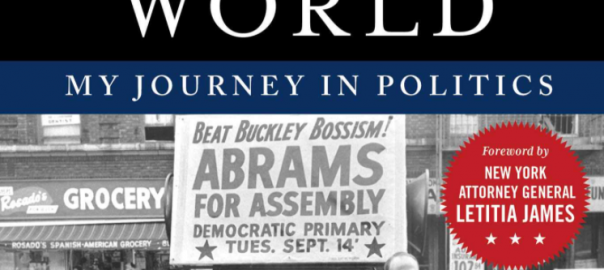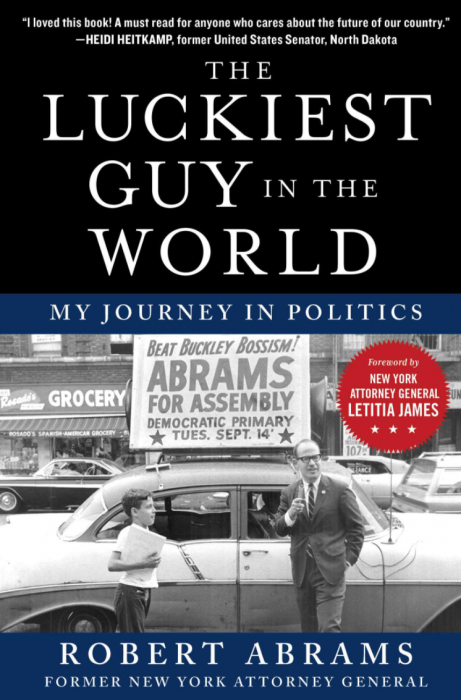
Bob Abrams’ Happy Warrior Memoir – A Joy Filled Read

If those who love to read about government and politics in New York State, want a respite from the trauma attending the divisive reality of pandemic politics, especially the tragic violence against Asian Americans, the sad dysfunction over voting rights nationally, and the allegations of scandal here at home in New York, I have a suggestion. Bob Abrams has just released his memoir of his life in politics and government entitled “The Luckiest Guy in the World.” Reading this book will restore one’s faith in the possibilities for progress on two fronts. One, that JFK was right, for civility is not a sign of weakness in politics. Two, that government can be made to work for regular folks.
Just as there is a coaching tree in terms of charting the history of NFL coaches, there is a de facto tree in politics. If I am correct in that analogy, then Bob Abrams is a branch on the Happy Warrior tree made famous by Al Smith and Hubert Humphrey. Instead of settling scores with old adversaries and frenemies like Ed Koch, Mario Cuomo and Al Sharpton, Abrams memoir takes the high road. He is honest about his differences with all three, but he goes to great pains to find common ground with those he jousted with in government and politics. Some criticized Abrams during his time in public service, for being too nice and never invoking fear among rivals or allies of crossing him. This book will not dissuade those critics of that assessment. But I believe that a deeper reading of this book, reveals that in the end Abrams triumphed and while nice guys may not always finish first (his close loss to Al D’Amato in the 1992 Senate race), in his case Abrams finished best by becoming a transformational Attorney General.

The most substantive chapters deal with his tenure as Attorney General. Abrams took an office that his predecessor Louie Lefkowitz found lasting popularity in dubbing himself the “people’s fixer”, and turned it into one where Abrams took those individual problems and crafted broad public law remedies to address the larger issues hidden in those individual cases. The chapters on Abrams’ development of the Attorney General’s office into becoming the lead protector on the environment through landmark cases on Love Canal and the mercury poisoning at the root of the Pymm Thermometer case, was replicated in the fields of antitrust, reproductive rights for women and civil rights.
But the book also reveals that Abrams was a political figure ahead of his time, opposing authoritarian regimes in his advocacy of the plight of Soviet Jewry and his bold early advocacy for LGBTQ rights before public opinion turned in favor of those rights. Abrams paid a price at the time for that kind of political bravery, even as now it appears he had no choice but to stand up for such rights. The stories in this book regarding those stands and the political intrigue surrounding his first two runs for Attorney General (the first unsuccessful but remarkably close loss to Lefkowitz in 1974 and the second where he succeeded in primary and general election landslides in 1978) are rich in the detail and the nuance of New York politics.
Abrams creativity in terms of building out the reach of the Attorney General’s office in New York, became a beacon for the rest of the nation as his fellow Attorneys General then and now readily attest. This book explains the ways and means of Abrams’ governing creativity. If you like how Josh Shapiro of Pennsylvania and Dana Nessel of Michigan as Attorneys General blocked the stop the steal canards in court to prevent Trump’s big lie from carrying the day, tip your cap to the Abrams model of how to proceed as an Attorney General. Certainly, here in New York, the activist tradition of recent Attorneys Generals built upon the foundation that Abrams poured from 1979-1993. Moreover, both the judiciary and the legislature are chock full of purposeful alumni of Abrams’ office who stayed with public service (e.g. Senator Shelley Mayer who chairs the Senate’s Education committee and the current Attorney General Tish James).
Fitting therefore that Tish James put it well and true when she wrote in the Foreword to this memoir of Robert Abrams” His legacy was manifest not only in New York, but across the nation. As the former president of the National Association of Attorneys General, his scholarship and influence loomed over the office. Abrams’ memoir reflects that and the intersection of faith, service to the community and legal acumen that engulfed his life….This book is a nostalgic look back in a lot of ways but the question of who we are, our values and matters worth fighting for are evident. It will cement your belief in the nobility of public service and engender great respect for a man—my mentor, who has dedicated his career to no greater cause.”
Let me step back in the spirit of full disclosure, I am not objective about my old friend Bobby Abrams. He was a political ally and friend of my late father Nicholas Gyory who was the President of the Hatters Union and the long- time leader of the old Liberal Party in the Bronx. Then I became friendly with Bob back in Mario Cuomo’s 1977 for Mayor, when Mario, Bob, Andrew Cuomo and I pounded the pavements for votes in the Bronx, especially along Pelham Parkway and in Co-op City. Bob and I also shared going to Christopher Columbus High School, Columbia College and NYU Law School, which we have often reminisced about with fond memories. And I remember well how formidable both his grandmother and mother were as campaigners especially in their back yard of Pelham Parkway. For any old Bronxites out there, Bob’s recollections in the book of his early days running for office in the Bronx will prove warm and enjoyable.
Finally, I served as an unofficial advisor to Bob’s losing 1992 campaign against Senator D’Amato. That campaign taught Democrats many hard lessons about the need to fight back against what appear to be outlandish attacks, rather than letting them go by unanswered as the Abrams’ campaign mistakenly did. That race also spoke volumes about the power of selecting the right words (had Abrams accused D’Amato of bullying rather than foolishly calling him a fascist in the heat of the moment, Abrams might not have lost a crucial week to ten days of picking up momentum). Abrams honestly addressed those mistakes in the book. But the silver lining for Democrats is that Chuck Schumer studied that campaign astutely and put those lessons to good use in defeating Senator D’Amato in the de facto rematch in 1998, which Schumer won. Democrats would be wise to continue internalizing both of those lessons going forward into future political battles.
Like the original happy warriors, Al Smith and Hubert Humphrey, Bob Abrams defeat in that 1992 Senate contest, will not erase his achievements as Attorney General, just as their records as Governor of New York and the senior Senator of Minnesota, were not eroded by their presidential defeats. In truth, because they did not achieve their ultimate political goals their respective achievements as Governor of New York, US Senator and in Abrams’ case Attorney General of New York, stand more clearly as lamps for good government.
Let me end as I began. If in this time of toxic travail in much of the body politic, those who yearn for effective governance are searching for a tonic, will find picking up Bob Abrams’ book at the local bookstore or on line at LuckiestGuyInTheWorldBobAbrams.com might bring restorative hope.
Abrams always struck me as a believer in the creed espoused in the African proverb, Adlai Stevenson brought back from his service at the United Nations, right around the time that Abrams political career started. That proverb, according to Stevenson, went like this” in quiet places reason abounds, that in quiet people there is vision and purpose and that many things are revealed to the humble which are hidden form the great.” So, if that proverb comports with your aspirations for politics, this book might just be chicken soup for your governing soul.
Bruce N. Gyory is a Democratic political strategist and an adjunct professor of political science at the University of Albany, SUNY.
